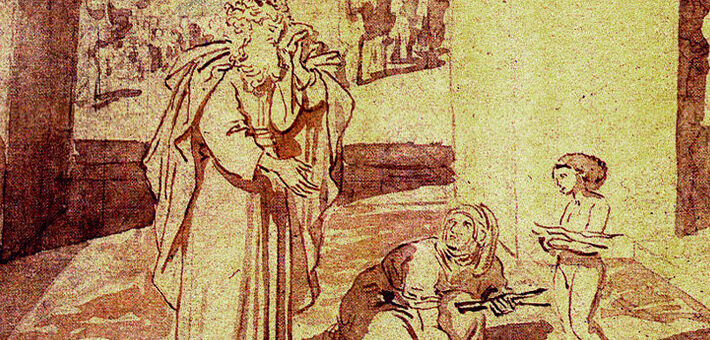Commentary on 1 Kings 17:1-16 [17-24]
The confidence and authority that Elijah exudes in today’s lesson could lead one to believe that by this point in the biblical narrative of the monarchies of Israel and Judah, he is an established character. We meet him having an audience with King Ahab of Israel and addressing him directly, even audaciously. Thus, it is a bit of a surprise when Elijah appears suddenly in 1 Kings 17:1, without introduction or back story. Perhaps his name—“The LORD/YHWH is my God”—is enough to set the scene and create the narrative tension, given that King Ahab has been found to be evil in the sight of the LORD (1 Kings 16:30).
The newly minted king of Israel is a worshiper of Baal, the Canaanite storm god, and has set up an altar for Baal as well as a sacred pole (a translation of the Hebrew term Asherah, which is a reference to a Canaanite mother goddess). In light of these practices that the biblical writer sees as idolatrous, Elijah emerges suddenly as a champion for the LORD/YHWH.
It may be helpful here to think about two different narratives: a) the biblical story, and b) a reconstruction of the history of the monarchies of Israel and Judah. The biblical narrative is a retrospective version of past events that favors the kingdom of Judah and its Davidic monarchy over that of Israel, and emphasizes the worship of only the LORD/YHWH in Jerusalem. The writer disapproves of worship in any other place or of any other god, and portrays that disapproval in terms of what the LORD/YHWH thinks (see 1 Kings 16:30).
From 1 and 2 Kings, one might get the impression that Judah was the more significant monarchy, and that worship of any deities other than the LORD/YHWH was a kind of “backsliding” from an already fully established tradition of exclusive worship of the LORD/YHWH, or influenced by “foreign” elements, such as Ahab’s Phoenician wife, Jezebel.
The second narrative—a reconstruction of events, using as evidence source materials such as texts from other places in the ancient Near East, along with archaeological evidence—suggests that Israel was the more populous, powerful, and politically connected of the two monarchies, until it was conquered by the Assyrians in the eighth century BCE. Judah became more populous and prominent in the region only after Israel’s fall.
In addition, inscriptional and material evidence confirms that Israelite/Judahite religion was quite diverse during the period of the monarchies, including worship of the deities Baal and Asherah alongside the LORD/YHWH. Biblical texts actually point to this too: a read through 2 Kings 23 lays out an amazing array of forms of worship in Jerusalem and environs, even in the temple!
Reading our lesson with the historical reconstruction in mind makes Elijah an even more interesting character. He simply shows up in the biblical story with a clear mission: to demonstrate that the LORD/YHWH is the true God. In 1 Kings 18, Elijah challenges 450 prophets of Baal to a contest to demonstrate the power of the LORD/YHWH over that of Baal (note here that Elijah, as a spokesperson for YHWH, is very much in the minority!). After Elijah wins the contest, the people who had assembled to watch say, “The LORD indeed is God; the LORD indeed is God” (1 Kings 18:39). Elijah then goes on to slaughter the prophets of Baal.
When we read this chapter carefully, we see that the LORD does not command either the contest or the massacre; the LORD only tells Elijah, “Go, present yourself to Ahab; I will send rain on the earth” (1 Kings 18:1). In his “zeal” for the LORD (1 Kings 20:10, 14) Elijah seems to undertake the confrontation of his own volition and approaches his mission of promoting the LORD/YHWH as God by eliminating other forms of worship through violent means.
Today’s lesson provides a very different model of what Elijah’s “zeal for the LORD” can look like. Following the LORD’s direction, Elijah travels outside Israel, to Phoenician territory, where he encounters a woman and her son. As a widow, the woman would have already been in a tenuous economic position; a drought would make her situation devastating. While Elijah is staying with the woman and her son, the LORD, through Elijah, multiplies her small reserve of food so they all are able to eat. Later in the chapter, when the widow’s son dies, Elijah’s hands-on method of healing and his entreaties to the LORD bring the boy back to life.
Elijah’s actions in both 1 Kings 17 and 18 served his mission of promoting the LORD/YHWH. In chapter 18, Elijah used confrontation and violence in an attempt to narrow the expression of worship in ancient Israel, yet despite Elijah’s efforts, the worship of Baal was not eradicated—you’ll recall the wide array of worship forms still present in 2 Kings 23! In chapter 17, that same champion for the LORD/YHWH provided a different and compelling vision of what it means to be a “troubler of Israel” (1 Kings 18:17): one of compassion and advocacy for those on the edge of survival, even beyond Israel’s borders.
PRAYER OF THE DAY
God of compassion,
By the power of God, Elijah provided bread and oil for the widow and her household. By faith in God, the widow provided food and water for Elijah. Give us hearts to love one another, so that in providing and in receiving, we too, might experience the unimaginable power of God, through the one who has provided life itself, your Son, Jesus Christ. Amen.
HYMNS
For all the saints ELW 422, H82 287, UMH 711, NCH 299
I sing a song of the saints of God H82 293, UMH 712, NCH 295
There’s a wideness in God’s mercy ELW 587, 588, H82 469, 470, UMH 121, NCH 23
CHORAL
Sing me to heaven, Daniel Gawthrop


November 3, 2024